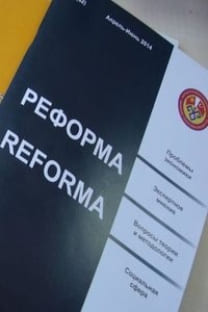KIRGIZİSTAN’IN MUHASEBE KÜLTÜRÜ
With the Collapse of Soviet Union several Turkish rooted republıcs have emerged in the central Asia. One of them is Kyrgyzstan. This study is trying to explore evolutıon and development of Kirgiz accountıng culture. However almost all newly established Turkish rooted countries are mostly still applying the rules and regulations determined by soviet Russia before the perestroika. Since 1991, when the Kirgiz government had freedom, government is trying to adapt its economy to free market economy, they are still in transition. Whereas, it is difficult to conclude they have reached to required degree of dynamism in accounting profession standards and rules and regulations.
Anahtar Kelimeler:
Central Asian Turkish Republics, accounting, Kyrgyzstan, auditing
ACCOUNTING CULTURE İN KYRGYZSTAN
With the Collapse of Soviet Union several Turkish rooted republıcs have emerged in the central Asia. One of them is Kyrgyzstan. This study is trying to explore evolutıon and development of Kirgiz accountıng culture. However almost all newly established Turkish rooted countries are mostly still applying the rules and regulations determined by soviet Russia before the perestroika. Since 1991, when the Kirgiz government had freedom, government is trying to adapt its economy to free market economy, they are still in transition. Whereas, it is difficult to conclude they have reached to required degree of dynamism in accounting profession standards and rules and regulations.
Keywords:
Central Asian Turkish Republics, accounting, Kyrgyzstan, auditing,
___
- Akay, Hüseyin – Nacimudinova, Seyil, “Kırgız Tekdüzen Hesap Planı ve Kırgız Tekdüzen Hesap Planının Türk Tekdüzen Hesap Planı İle Karşılaştırılması”, Manas Üniversitesi Sosyal Bilimler Dergisi Sayı:16, s. 57-77, 2006.
- Akay, Hüseyin – Nacimudinova, Seyil, “Kyrgyz Accounting Law in Soviet and İndependence Period”, 12th World Congress of Accounting Historians, Congress Proceedings Vol: I, July 20-24, s. 441-450, 2008, İstanbul-Türkiye.
- Akay, Hüseyin – Pirimbayev, Cusup, “Kırgızistan’da Muhasebe Eğitimi ve Uluslararası Muhasebe Standartlarının Muhasebe Eğitimindeki Rolü Üzerine Bir Araştırma”, XXV. Türkiye Muhasebe Eğitimi Sempozyumu Kitapçığı, Hacettepe Üniversitesi Yayınları, 19-23 Nisan, 2006, s. 209-217, 2006, Bodrum-Türkiye.
- Anvaripour, Neside Tas – Reid, Barry – Jusupbekov, Aybek, Diagnostic Study of Accounting and Auditing Practices in Kyrgyz Republic, Asian Development Bank, 2004, Philippines.
- Finansal Raporlama ve Denetim Standartları Devlet Komisyonu, Denetim Kanunu, 2002, Bişkek-Kırgızistan.
- Hakikat, Tercüme, Kırgızistan Tek Düzen Hesap Planı, Hakikat tercüme Limited Şirketi, 2012, Bişkek-Kırgızistan.
- Karakaya, Mevlüt, “Studies on Accounting Standards in Kyrgyzstan”, Gazi Üniversitesi, İ.İ.B.F. Dergisi, Sayı 3, s. 91-106, 1999.
- Karamollaoğlu, A Ömer, “Kırgız Sayıştayının Kapasite Geliştirme Faaliyetleri”, Sayıştay Dergisi, Sayı: 81, s. 143-153, Nisan-Haziran, 2011.
- Kırgızistan Muhasebe Kanunu, Finansal Raporlama ve Denetim Standartları Devlet Komisyonu, 2 Nisan, 2002, Bişkek-Kırgızistan.
- Öz, Ersan-Gülten, Selçuk-Yusufoğlu, Arkan, “Kırgızistan’da Girişimcilik Faaliyetlerinin Finansal ve Vergisel Yönleri”, 6. Uluslararası Girişimcilik Kongresi (ICE’14), 24-26 Nisan-2014, s. 245-251, 2014, Bişkek-Kırgızistan.
- 117 nolu Kırgız Cumhuriyet Kırgız Sayıştayı Kanunu, 13.08.2004, Bişkek-Kırgızistan.
- ISSN: 1694-5158
- Yayın Aralığı: Yılda 2 Sayı
- Başlangıç: 1999
- Yayıncı: Kırgızistan Türkiye Manas Üniversitesi
Sayıdaki Diğer Makaleler
TEKSTIL ÜRÜNLERI TÜKETIMININ LOGIT MODELI YÖNTEMIYLE ANALIZI
Anarkül URDALETOVA, Ebru ÇAĞLAYAN, Gülnara KARADENİZ
PİYASA SEMALARINDA HAYEK’İN VE WEBER’İN GÖRÜNTÜSÜ
THE STATE'S ROLE IN THE IMPLEMENTATION OF THE NATIONAL INNOVATION
TWIN DEFICIT HYPOTHESIS: KYRGYZSTAN CASE
FOREIGN ECONOMIC POLICY OF CHINA IN KYRGYZSTAN
TERRORISM AND ORGANIZED CRIME: THREATS TO NATIONAL SECURITY OF CENTRAL ASIA
KIRGIZİSTAN’IN MUHASEBE KÜLTÜRÜ
REMITTANCES AND EMPLOYMENT YOUTH IN KYRGYZSTAN
Kamalbek KARYMSHAKOV, Raziya ABDİEVA, Burulcha SULAİMANOVA
DEVELOPMENT OF RURAL TERRITORIES: CAPACITY BUILDING OF LOCAL COMMUNITIES
